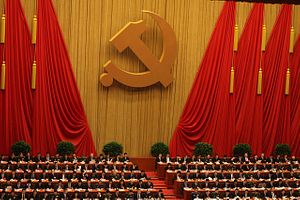Ahead of the 19th National Congress of the Chinese Communist Party (CCP), China announced that former justice minister, Wu Aiying, has been expelled from the party for “serious discipline problems.” It’s the first time the CCP revealed the information; Wu had quietly stepped down from her position in February.
Wu, 65, had served as justice minister for 12 years until February, when she was suddenly removed from her position by the Chinese authorities without a stated reason. Wu was the second female justice minister since the founding of the People’s Republic of China in 1949. She was also a member of the 18th Central Committee of the CCP. So far, a total of 16 members of the 18th Central Committee have been expelled from the party.
On October 14, the CCP released a statement after a four-day plenary meeting of the 18th Central Committee. The statement included a list of senior party as well as government officials that have been expelled from the party. While the expulsion of many other officials — including Sun Zhengcai, the former top leader of Chongqing city — had already been individually announced earlier, the list was the first time that Wu’s expulsion was revealed. The statement said that Wu, together with other officials, had “serious discipline problems,” without elaborating details. It’s also unclear whether Wu could face criminal prosecution or other punishment. In comparison, Sun’s case has been transferred by the Central Commission for Discipline Inspection (CCDI) to the judiciary, which means Sun will face criminal prosecution soon.
According to Wu’s official resume, Wu had no legal background before she moved to Beijing to assume the position of deputy minister in the justice ministry in late 2003. Prior to that, she had spent most of her career working in Shandong province and rose to the deputy provincial party chief in 2002. Some Chinese legal experts referred to Wu as “an illiterate in law.” Based on multiple news reports, Wu tended to focus most of her attention on maintaining the regime’s stability throughout her career, including her time in the justice ministry.
In 2016, about 400 Chinese lawyers as well as ordinary citizens signed a public petition demanding that the Chinese authorities remove Wu from her position. These petitioners said the justice ministry under Wu had issued a series of regulations and laws which were against the Constitution.
Yet it seems that Wu’s final expulsion has nothing to do with this petition. “Wu’s fall shortly followed the arrest in June of Lu Enguang, former head of the ministry’s political department,” reported Caixin.
Earlier reports by the Chinese authorities said that Lu had conducted bribery and fabricated large portions of his resume, including his age, educational background, work experience, family background, and even his own name. “The head of the justice ministry should take a major responsibility that Lu Enguang could have been transferred to the justice ministry and become a senior leader,” said the Chinese authorities. Wu appears to have been held responsible for the case.

































